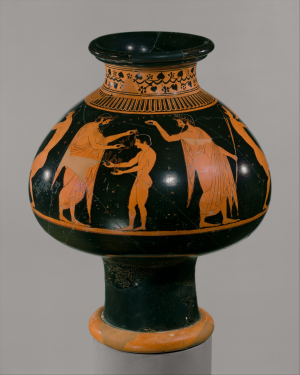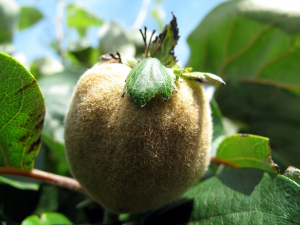(Boylove Documentary Sourcebook) - An Excerpt from 'Clouds' by Aristophanes

From Homosexuality in Greece and Rome: A Sourcebook of Basic Documents, edited by Thomas K. Hubbard (Berkeley: University of California Press, 2003). Footnotes omitted.
This play was originally produced in 423 B.C.E., but this part was probably added when Aristophanes revised the play around 417. Socrates stages this debate between the Better and Worse Argument to convince the young Pheidippides to enter his school and learn his clever ways.
[...]
BETTER ARGUMENT: Very well, I will describe how the old education was managed, in the days when I and my just cause flourished and it was the done thing to be decent. First of all, it was the rule that not a sound should be heard from a boy, not a grunt; then, the boys of the neighborhood had to walk through the streets to the music-master’s together and in good order and without cloaks, even if it was snowing as thick as barley groats. Then again he would teach them to learn a song by heart, and not to keep their thighs together while doing so—a song such as “Pallas the terrible, sacker of cities” or “A strain that sounds afar,” singing it in the mode their fathers handed down. And if any of them played the clown or introduced some convolution such as the moderns use, those annoying twists in the style of Phrynis, he was thrashed hard and often for disfiguring the music. At the gymnastic trainer’s the boys, when they sat down, had to cover themselves with their thighs, so as not to expose to the onlookers anything that was—cruel; and then, when they stood up again, they had to smooth the sand down, and take care not to leave behind for their lovers the impress of their manhood. In those days, too, no boy would anoint himself below the navel, and so on their private parts there was a coat of dewy down like on quinces; nor would he water down his voice to speak tenderly to his lover and walk along making eyes and being his own pimp. Nor was he allowed when dining to pick up a head of the radish, nor to snatch his elders’ dill or celery, nor to eat dainties, nor to giggle, nor to have his legs crossed.
WORSE ARGUMENT: What antiquated rot, smelling of the Dipolieia, and crawling with cicadas, Cedeides, and ritual bovicide!
BETTER ARGUMENT: But what matters is that these are the ways in which my education bred the men who fought at Marathon. While you teach the young of today to swaddle themselves in cloaks right from the start, which makes me choke with rage, when they have to dance at the Panathenaea, and one of them holds his shield in front of his ham, caring nothing for Tritogeneia. So, my lad, choose me, the Better Argument, with confidence; and you will know to hate the Agora and shun the bathhouses; and to be ashamed of what is shameful; and to flare up when someone makes fun of you; and to give up seats to your elders when they approach; and not to act rudely towards your own parents; nor to do anything else disgraceful that would defile the statue of Honor; nor to rush into a dancing-girl’s house, lest while you’re panting after that sort of thing you may have an apple thrown at you by a little whore and so have your good name shattered; nor to contradict your father in anything; nor to call him Iapetus and so cast his years in his teeth, those years which were spent in rearing you from a nestling.
WORSE ARGUMENT: If you follow this advice of his, my lad, then, by Dionysus, you’ll become like the sons of Hippocrates, and they’ll call you a pap-sucker.
BETTER ARGUMENT: But you’ll be spending your time in gymnasia, with a gleaming, blooming body, not in outlandish chatter on thorny subjects in the Agora like the present generation; nor in being dragged into court over some sticky, contentious, damnable little dispute; no, you will go down to the Academy, and under the sacred olive-trees, wearing a chaplet of green reed, you will start a race together with a good decent companion of your own age, fragrant with green-brier and catkin-shedding poplar and freedom from cares, delighting in the season of spring, when the plane tree whispers to the elm. [more quickly] If you do these things I tell you, and bend your efforts to them, you will always have a shining breast, a bright skin, big shoulders, a minute tongue, a big rump and a small prick. But if you follow the practices of the youth of today, for a start you’ll have a pale skin, small shoulders, a skinny chest, a big tongue, a small rump, a big ham and a long . . . winded decree; and he [indicating Worse Argument] will talk you into believing whatever is foul to be fair, and whatever is fair foul; and on top of that he will infect you with the faggotry of Antimachus.

See also
- Adult friend (dictionary)
- Age of attraction (dictionary)
- Athenian pederasty
- Boylove
- Cretan pederasty
- Ephebophilia
- Eromenos
- Greek love
- Historical boylove relationships in ancient Greece
- Loved boy (dictionary)
- Minor-attracted person (dictionary)
- Pederasty in ancient Greece
- Pedophilia
- Philosophy of ancient Greek pederasty
- Spartan pederasty
- Theban pederasty
- Young friend (dictionary)